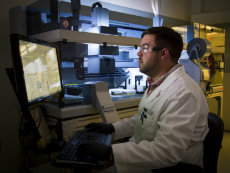September 27, 2018, by Dinah Singer, Ph.D.

Credit: National Cancer Institute
With the increasing use of advanced technologies and the rise of big data in cancer research, a challenge for the cancer research community has been sustaining a stable workforce of experienced scientists with the skills and expertise to take fullest advantage of these tools and resources to better understand the complexities of cancer.
In response to this challenge, NCI launched a new grant opportunity in 2016 called the R50 Research Specialist Award. In fact, the funding announcements for 2019 R50 grants were released just last month and we’re hoping to receive many applications from qualified candidates.
Although NCI and other NIH institutes offer many funding opportunities for independent investigators who operate their own labs or large research projects, NCI’s R50 grant is the only one intended to support experienced scientists who are not independent investigators.
The staff and data scientists who can apply for the R50 award are often intimately involved in essential cancer research projects that use highly sophisticated experimental approaches and an expanding suite of advanced technologies.
The roles of these research specialists can include pursuing lab-based basic cancer biology and preclinical research, performing high-throughput assays to identify potential cancer drugs, developing software and analyzing big data from cancer studies, and managing research cores—shared research facilities for scientists that specialize in specific, often highly technical, experimental techniques (e.g., high-throughput single-cell sequencing to understand how different cancer cells in a tumor respond to a drug). The value and importance of these scientists in cancer research cannot be overstated.
The R50 award supports staff researchers, core facility managers, and data scientists with up to 5 years of salary support and annual travel funds for cancer research conferences and trainings. The recognition and funding of the R50 aims to attract and maintain important research specialists who are essential for NCI-funded research programs. Currently, over 50 research specialists receive R50 funding.
Scientists who have received R50 awards report that the financial support and stability it provides allows them to be more productive in their research, gives them time to work on developing new experimental methods, and provides travel opportunities to work with scientists at other universities. (See sidebar)

Dinah Singer, Ph.D.
Director, NCI Division of Cancer Biology
Credit: National Cancer Institute
The Importance of a Stable Workforce for Cancer Research
NCI’s mission is to conduct and support cancer research to advance the understanding, prevention, diagnosis, and treatment of cancer to help people live longer, healthier lives. Strengthening the cancer research workforce is imperative for this research mission.
The R50 award also helps NCI overcome a major barrier in maintaining a sustainable cancer research workforce. The reliance of many laboratories on graduate students and post-doctoral fellows for research has led to problems of long-term laboratory stability. By supporting experienced staff and data scientists who improve research efficiency and play an important role in ongoing research projects, the R50 contributes to the amelioration of this research workforce issue.
The R50 award for staff and data scientists within NCI-funded programs is one way that NCI is supporting a stable workforce to advance cancer research.
I encourage staff researchers in labs, managers of core facilities, and computational scientists in data science centers to apply for a lab-based or core-based R50 award by January 11, 2019.
NCI wants to recognize the importance of the research specialist to the cancer research enterprise by enabling these exceptional scientists to have a sustainable cancer research career and continue to make progress in studies of cancer.
What Has the R50 Award Meant to You?
An R50 award can have significant and long-lasting benefits for the scientists who receive them. Here’s a sampling of what some had to say about the impact the R50 award has had on their careers:
“I don’t have to focus as much time on writing grants or worrying about my job security. I can spend more time doing research and publishing it.” Laura Pascal, Ph.D., research assistant professor, University of Pittsburgh
“The [R50 award] travel stipend enables me to host training workshops outside the Broad Institute on using our software to study cancer biology.” Brian Haas, M.S., senior computational biologist, Broad Institute
“With the salary support from the R50, I’ve been able to concentrate on the technical work at my facility and developing new methods in metabolomics for the cancer research community.” Wenyun Lu, Ph.D., the technical director of the Regional Metabolomics Core at Princeton University







